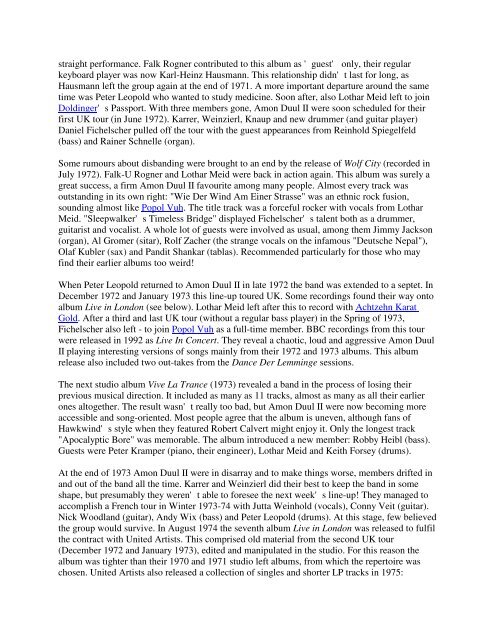Cosmic Dreams at Play - Stoned Circus radio show - Free
Cosmic Dreams at Play - Stoned Circus radio show - Free
Cosmic Dreams at Play - Stoned Circus radio show - Free
You also want an ePaper? Increase the reach of your titles
YUMPU automatically turns print PDFs into web optimized ePapers that Google loves.
straight performance. Falk Rogner contributed to this album as 'guest' only, their regular<br />
keyboard player was now Karl-Heinz Hausmann. This rel<strong>at</strong>ionship didn't last for long, as<br />
Hausmann left the group again <strong>at</strong> the end of 1971. A more important departure around the same<br />
time was Peter Leopold who wanted to study medicine. Soon after, also Lothar Meid left to join<br />
Doldinger's Passport. With three members gone, Amon Duul II were soon scheduled for their<br />
first UK tour (in June 1972). Karrer, Weinzierl, Knaup and new drummer (and guitar player)<br />
Daniel Fichelscher pulled off the tour with the guest appearances from Reinhold Spiegelfeld<br />
(bass) and Rainer Schnelle (organ).<br />
Some rumours about disbanding were brought to an end by the release of Wolf City (recorded in<br />
July 1972). Falk-U Rogner and Lothar Meid were back in action again. This album was surely a<br />
gre<strong>at</strong> success, a firm Amon Duul II favourite among many people. Almost every track was<br />
outstanding in its own right: "Wie Der Wind Am Einer Strasse" was an ethnic rock fusion,<br />
sounding almost like Popol Vuh. The title track was a forceful rocker with vocals from Lothar<br />
Meid. "Sleepwalker's Timeless Bridge" displayed Fichelscher's talent both as a drummer,<br />
guitarist and vocalist. A whole lot of guests were involved as usual, among them Jimmy Jackson<br />
(organ), Al Gromer (sitar), Rolf Zacher (the strange vocals on the infamous "Deutsche Nepal"),<br />
Olaf Kubler (sax) and Pandit Shankar (tablas). Recommended particularly for those who may<br />
find their earlier albums too weird!<br />
When Peter Leopold returned to Amon Duul II in l<strong>at</strong>e 1972 the band was extended to a septet. In<br />
December 1972 and January 1973 this line-up toured UK. Some recordings found their way onto<br />
album Live in London (see below). Lothar Meid left after this to record with Achtzehn Kar<strong>at</strong><br />
Gold. After a third and last UK tour (without a regular bass player) in the Spring of 1973,<br />
Fichelscher also left - to join Popol Vuh as a full-time member. BBC recordings from this tour<br />
were released in 1992 as Live In Concert. They reveal a chaotic, loud and aggressive Amon Duul<br />
II playing interesting versions of songs mainly from their 1972 and 1973 albums. This album<br />
release also included two out-takes from the Dance Der Lemminge sessions.<br />
The next studio album Vive La Trance (1973) revealed a band in the process of losing their<br />
previous musical direction. It included as many as 11 tracks, almost as many as all their earlier<br />
ones altogether. The result wasn't really too bad, but Amon Duul II were now becoming more<br />
accessible and song-oriented. Most people agree th<strong>at</strong> the album is uneven, although fans of<br />
Hawkwind's style when they fe<strong>at</strong>ured Robert Calvert might enjoy it. Only the longest track<br />
"Apocalyptic Bore" was memorable. The album introduced a new member: Robby Heibl (bass).<br />
Guests were Peter Kramper (piano, their engineer), Lothar Meid and Keith Forsey (drums).<br />
At the end of 1973 Amon Duul II were in disarray and to make things worse, members drifted in<br />
and out of the band all the time. Karrer and Weinzierl did their best to keep the band in some<br />
shape, but presumably they weren't able to foresee the next week's line-up! They managed to<br />
accomplish a French tour in Winter 1973-74 with Jutta Weinhold (vocals), Conny Veit (guitar).<br />
Nick Woodland (guitar), Andy Wix (bass) and Peter Leopold (drums). At this stage, few believed<br />
the group would survive. In August 1974 the seventh album Live in London was released to fulfil<br />
the contract with United Artists. This comprised old m<strong>at</strong>erial from the second UK tour<br />
(December 1972 and January 1973), edited and manipul<strong>at</strong>ed in the studio. For this reason the<br />
album was tighter than their 1970 and 1971 studio left albums, from which the repertoire was<br />
chosen. United Artists also released a collection of singles and shorter LP tracks in 1975:


